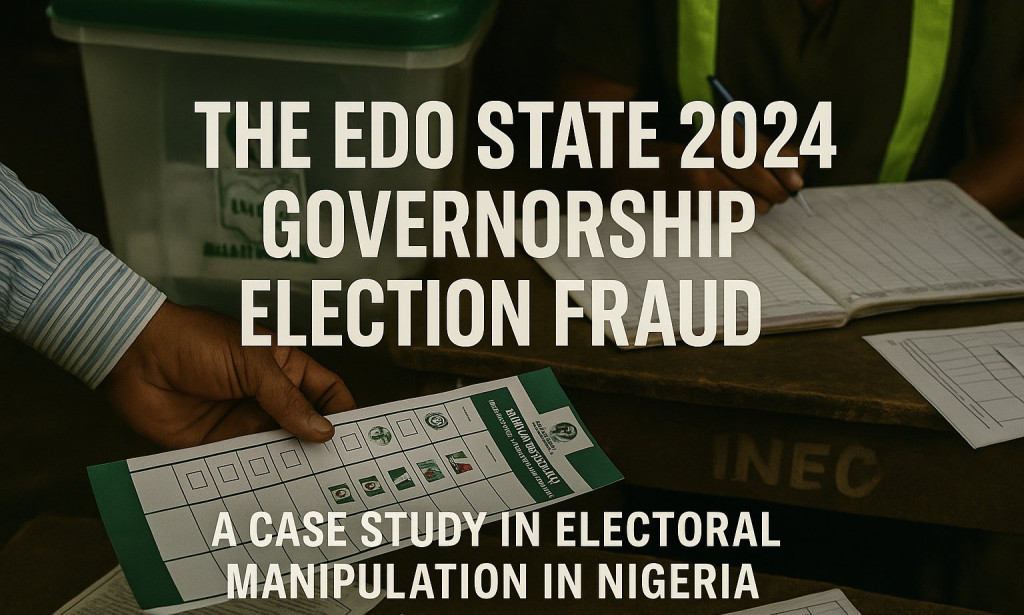
In a nation once full of promise, Nigeria now stands at a critical crossroads, with its democratic foundations crumbling under the weight of systematic election fraud and institutional corruption. The recent Edo State governorship election and subsequent tribunal ruling have laid bare the harsh reality that Nigeria has descended into a failed state where the voice of the people no longer matters. As we witness the brazen manipulation of our electoral process, it becomes increasingly clear that only a peaceful revolution can restore the sanctity of our democracy.
The September 2024 Edo State governorship election represents a textbook example of how the Independent National Electoral Commission (INEC) has become the primary instrument for subverting democracy in Nigeria. Evidence from independent poll watchers confirms that INEC's declaration of the APC candidate as winner was fraudulently made using result sheets that were not the ones actually used at polling units. INEC allegedly printed two different result sheets and used one set to declare results entirely unrelated to the real results uploaded to its own result viewing portal. This deliberate manipulation strikes at the very heart of electoral integrity.
Despite the Electoral Act mandating that serial numbers of all materials used for voting should be written in a prescribed form before voting begins—a safeguard specifically introduced to prevent INEC officials from diverting sensitive materials to politicians—these critical protections were flagrantly violated in the Edo election. The result was a declared outcome that bore little resemblance to the votes actually cast by citizens.
The discrepancies between polling unit results and the final tallies announced by INEC were staggering. The petitioners identified wrong computation of results in 765 polling units across the state, with specific examples where "25 votes metamorphosed to a 525 votes at a particular collation center." Such mathematical impossibilities aren't errors,they're evidence of systematic fraud designed to ensure a predetermined outcome regardless of how citizens actually voted.
When citizens turn to the judiciary for redress, they expect fair and impartial consideration of evidence. Instead, the Edo Election Tribunal has become complicit in legitimizing electoral fraud. The Tribunal's April 2, 2025 judgment dismissed the petition against INEC's declaration of the APC candidate as winner, despite overwhelming evidence of result manipulation. The judgment perpetuates judicial support for electoral mismanagement and represents what has become the fate of democracy in Nigeria.
The Tribunal's decision ignored fundamental legal principles established by the Supreme Court regarding electoral integrity. Section 73(2) of the Electoral Act mandates that before polls commence, INEC must record serial numbers of all sensitive materials in the prescribed form (Form EC25B), and failure to do so automatically renders election in that polling unit void. This is a 'strict liability provision' according to the Supreme Court in Augustine v. INEC. Yet, the Tribunal chose to disregard these legal safeguards.
Even more disturbing was the Tribunal's approach to the evidence. INEC's counsel argued that the "polling unit agents called as witnesses signed the result sheet and could not distinguish between what they heard and what they saw," claiming this "indicates that the election was conducted in compliance with the Electoral Act, 2022." This reasoning defies logic—how can signatures obtained under duress or before tampering occurred be evidence of integrity rather than part of the manipulation?
What we are witnessing is not merely isolated incidents of electoral malpractice but the complete transformation of INEC from an independent electoral umpire to an active participant in undermining democracy. What the Edo Governorship Tribunal did in effect is to validate an electoral coup executed by INEC. They have allowed INEC to hijack the constitutionally protected power of citizens to elect their leaders, endorsing a system that enables INEC to handpick winners without regard for the will of the people.
The Edo election is merely a symptom of a deeper malaise. Nigerian elections are flawed because INEC is constrained by institutional weaknesses, demonstrated by its lack of adherence to guidelines, corruption, and lack of independence. Evidence shows that the ruling political party heavily influences INEC's activities. When the institution charged with protecting the electoral process becomes its greatest saboteur, democracy cannot survive.
The technology that was meant to enhance transparency has instead been weaponized to facilitate fraud. Although INEC uploaded over 98% of polling unit result sheets to its Results Viewing Portal (IReV) during the Edo election, these electronic results were effectively rendered meaningless when INEC declared results based on an entirely different set of physical documents. This demonstrates how INEC creates the illusion of transparency while systematically undermining it.
When citizens can no longer trust the electoral process to reflect their will, when judicial remedies fail to correct obvious wrongs, and when state institutions actively work against the principles they were established to uphold, we must confront the painful reality: Nigeria has become a failed state.
Corruption has caused a crisis of trust in Nigeria's institutions and society. The failure to address this corruption has led to political clientelism and impunity, creating a perception among citizens that there is no accountability for those involved in corruption. The electoral process has become perhaps the most corrupted institution of all, as it determines who will control the levers of power and, by extension, access to the nation's resources.
A 2023 national household survey revealed a severe crisis of public trust in Nigeria. The president and federal government were among the least trusted institutions, with 36 and 35 percent of respondents respectively stating they distrusted those institutions "greatly." This collapse of trust is not surprising when citizens repeatedly see their votes rendered meaningless through manipulated electoral processes.
Nigeria has effectively become a one-party state in practice, if not in name. A party's dominance in Nigeria's electoral process is reinforced through unequal access to state institutions, financial resources, and mass media, with the ruling party systematically undermining opposition parties since Nigeria's return to democratic rule in 1999. When the ruling party controls INEC and can determine election outcomes regardless of actual votes cast, the multi-party system becomes a mere façade.
The Path Forward: The Case for Peaceful Revolution
Given this grim reality, it is no longer reasonable to expect meaningful change through the very institutions that have been corrupted. Nigeria requires a peaceful revolution—a fundamental reconstruction of our democratic architecture from the ground up.
This revolution need not be violent. Indeed, violence would only further harm our fragile nation. Instead, we must engage in a sustained, nationwide civil resistance campaign that makes the country ungovernable for those who have hijacked our democracy. Strategic nonviolent actions—including mass protests, strikes, boycotts, and civil disobedience—have proven effective in toppling corrupt regimes worldwide.
For such a peaceful revolution to succeed, it must encompass several key elements:
-
Mass mobilization across ethnic and religious lines: Nigeria's diversity has often been exploited to divide us. A successful revolution must unite citizens across these divides around our common interest in genuine democracy and good governance.
-
Clear demands for systemic reform: Beyond merely changing faces in power, we must demand comprehensive electoral reforms that strip INEC of its ability to manipulate results, establish truly independent oversight of elections, and ensure severe consequences for electoral fraud.
-
International solidarity and pressure: Nigeria does not exist in isolation. International recognition of our democratic crisis and targeted pressure against those undermining democracy can help create conditions for change.
-
Protection of the revolution: Nonviolent discipline must be maintained, and mechanisms created to prevent the movement from being hijacked by opportunists or descending into chaos.
-
A clear transition plan: The revolution must not only tear down the corrupt system but also build a new one with stronger democratic safeguards and institutions that serve the people rather than the powerful.
The Edo election and subsequent tribunal ruling are not isolated incidents but reflections of a pattern that has made a mockery of Nigerian democracy. If the judiciary allows the travesty that took place in Edo State to stand, "then we might as well all go home. 2027 and all other elections will be farcical, impotent rituals used by the ruling class to give the unilateral appointment of political officeholders the imprimatur of democratic responsibility."
The declaration of fake results by INEC has become normalized, with the judiciary providing cover for this electoral fraud. Nigeria's democratic experiment stands at the precipice of failure. We can either accept permanent subjugation to a corrupt political class that has mastered the art of election manipulation, or we can rise up in peaceful resistance to reclaim our democratic rights.
Our nation deserves better. The millions of Nigerians who queue for hours to vote deserve to have those votes counted honestly. The young people whose future is being mortgaged by corrupt leadership deserve a voice in determining their destiny. The only path to restoring trust in our democratic system is through revolutionary change that dismantles the current fraudulent electoral apparatus and rebuilds it with genuine integrity and accountability at its core.
The time for half-measures and incremental reforms has passed. Nigeria's survival as a democracy demands nothing less than peaceful revolution. The question is not whether such a revolution is necessary—it is whether we have the courage to undertake it.



You must be logged in to post a comment.